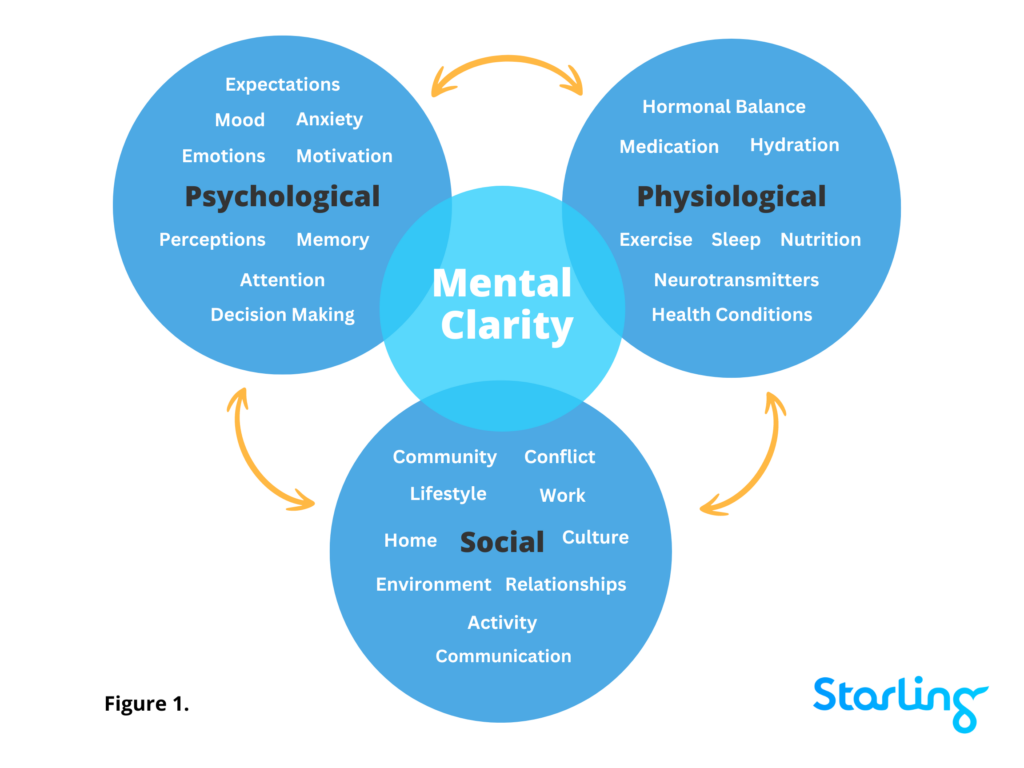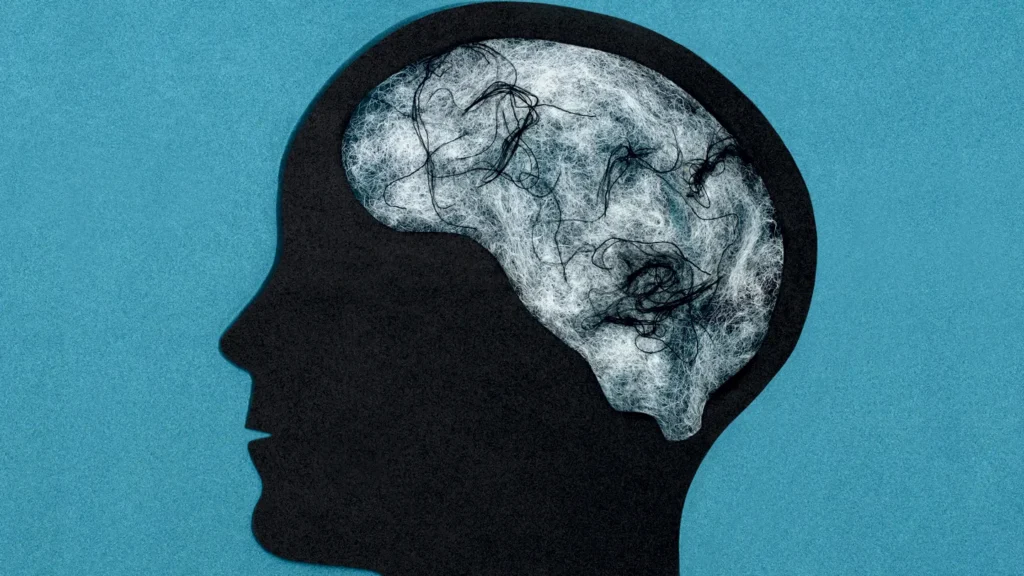Recognizing that you’re in the fog is the first step to getting out.
In the hustle and bustle of today’s society, it’s normal to experience moments of mental cloudiness, where thoughts seem fuzzy and concentration wanes. This phenomenon, commonly referred to as “brain fog,” can be frustrating and concerning, particularly when it persists, interfering with daily tasks and the ability to connect. So, what is brain fog, what causes it, and what are the potential health impacts? More importantly, how can we effectively manage it? Let’s delve into these questions to gain a deeper understanding of brain fog.
Though not a medical condition itself, brain fog is characterized as a type of cognitive dysfunction. It is a symptom that encompasses a lack of mental clarity that impacts memory, focus, and general awareness.
Despite being a “normal” symptom, brain fog can be an indicator of other underlying conditions and stressors. Just like your vehicle’s engine light, it can easily go unnoticed, but it’s an important signal from your mind and body that a check-up is necessary.
Identifying symptoms and causes
Individuals may experience varying levels of different symptoms, but in general, symptoms may include:
- A lack of awareness of time, emotions, thoughts and body
- Forgetfulness
- Difficulty translating thoughts into words
- Feeling overwhelmed with day-to-day activities
- Decreased motivation
- Mental and/or physical exhaustion
It is common to experience surges of brain fog when going through life events and transitions with heightened stress. Individuals experiencing brain fog related to short-term physical and emotional stressors tend to find relief once they have addressed the stressors or they have naturally subsided with time.
On the other hand, some people experience prolonged and even chronic levels of brain fog. These individuals might feel an overbearing sense of hopelessness, mental absence and a lack of control in their daily lives. This not only impacts the individual but also their environment and interpersonal relationships. Short and long-term causes of brain fog may include a range of both physical and psychological conditions:
- COVID-19
- Fibromyalgia
- PTSD
- Anxiety
- Pregnancy/Hormonal changes
- Insufficient nutrition
- Unhealthy sleep habits
- Depression
- Medications
- Grief/Bereavement
- Lack of or limited physical activity
- ADHD
The impact of stress
Though stress can be an initial driver in the development of brain fog, it can also manifest as a side effect of the above conditions. In either of these cases, it can exacerbate both the intensity and progression of brain fog and other compounding symptoms.
When considering the impacts of stress, it is important to examine it as a whole. A holistic view allows us to understand not only the psychological, physiological, and social aspects of brain fog but also how they interact with one another.
When we experience stress, it triggers a physiological reaction. Our immune and nervous systems are activated, and our bodies release cortisol, the primary stress hormone. If stress continues over an extended period, it leads to inflammation and elevated cortisol levels in the brain, which in turn affects brain function. Psychologically, this impacts the areas of the brain responsible for learning, memory, emotions, motivation, and decision-making.
How these brain areas are affected can hinder mental clarity, capacity, communication and the overall ability to connect. Socially, individuals experiencing brain fog frequently feel overwhelmed, which can cause them to withdraw and feel more isolated. Though they may want to feel better, this impairment makes it challenging to establish and maintain meaningful relationships within their communities.

By understanding these impacts, we can acknowledge the significant interplay between our physiological, psychological, and social responses to stress and how they relate to brain fog. As illustrated in Figure 1, different stress responses and their influences on each other can exacerbate and mitigate the symptoms that affect our mental clarity.
This highlights the importance of recognizing our role in responding to stress.
Stress in its many forms is a part of life, influenced by many external factors beyond our control. What we can work to build on is our resilience and response to stress. By recognizing our ability to manage stress, we can learn and take an active role in shaping our lives for the better, rather than remaining passive about our mental health.
Clearing the fog
Exploring where your brain fog is coming from can feel intimidating, but will ultimately lead to positive changes that will enhance your quality of life.
Particularly in the case of chronic brain fog, identifying your symptoms and acquiring blood tests with a healthcare professional is highly recommended and can help diagnose the presence of a physical condition. With their help, you can better understand the influence of medications, physical activity, and nourishment, and work to find solutions that promote better brain health.
Understanding how stress can trigger and exacerbate symptoms like brain fog may seem overwhelming, however, our capacity to cope is often better than we think, and we can stop this vicious cycle once we are aware of it.
In his recent TEDx Talk, The Founder of Starling Minds, Andrew Miki, put it simply in saying, “the definition of insanity is doing the same thing, over and over again, and expecting a different response (…) the good news is that if we understand our unhelpful coping mechanisms, we can all unlearn them to improve our mental health.”
Mindful techniques to implement
Try out the steps below to build awareness of your patterns and establish a healthy environment to explore new coping mechanisms.
- Reflect. Consider your day-to-day coping mechanisms – create some time at the end of the day to reflect and journal what you did that you felt was truly good for you that day. If you cannot think of anything, take this opportunity to create a list of the things you know you are not currently doing in your life to contribute to your well-being. We encourage you to think of things that relate to deep joy and restoration in your life.
- Create. Allow yourself to try new coping mechanisms. Allow yourself to experience, learn and then decide what feels helpful.
- Manifest. Talk to your support system about what you are integrating into your life and what you are trying to release. Keep the conversation going alongside your actions. Let them know how they can support you.
- Be gentle with yourself. Your success in coping is not measured by avoiding the experience of stress. Allow yourself to learn what works and what doesn’t. Finding that a technique or coping mechanism does not work for you is not a failure. These are some of the truest forms of success that lead you to understand who you are and build a life that aligns with you and your needs.
Conclusion
We’ve now explored what brain fog feels and looks like as well as how it impacts our minds, bodies and even our connections. Building a strong awareness of the symptoms, causes and impacts from a holistic point of view is the first step to navigating our way out of the fog. However, effectively managing brain fog involves not only addressing physical health through proper nutrition, sleep, and exercise but also fostering mental resilience and developing effective coping mechanisms.
The path to clarity often involves changing the habits that contribute to stress and embracing new, healthier ways of coping. Reflecting on your daily routines, experimenting with new strategies, and engaging your support system are vital steps in this journey.
You know yourself best, but you may not have had the chance to learn how to listen to and understand the signals from your mind and body. Now, with a deeper understanding of your ability to cope and reshape your responses to stress, you have the power to take proactive steps and create the space to learn. This will ultimately help clear the fog and enhance both your cognitive function and overall well-being.
Learn more: starlingminds.com
Are you a member? Register at member.starlingminds.com.




